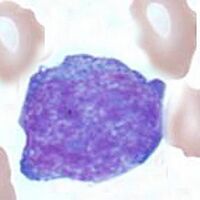Test: Difference between revisions
From haematologyetc.co.uk
No edit summary |
No edit summary |
||
| Line 34: | Line 34: | ||
|colspan="1" style = "background:#66e0ff;"| | |colspan="1" style = "background:#66e0ff;"| | ||
|colspan="1" style = "font-size:80%;"|- | |colspan="1" style = "font-size:80%;"|- | ||
|colspan="1" style = "font-size:80%;"| | |colspan="1" style = "font-size:80%;"| | ||
|- | |- | ||
|colspan="1" style = "font-size:90%; color:black;" |'''CD23''' | |colspan="1" style = "font-size:90%; color:black;" |'''CD23''' | ||
Revision as of 13:03, 12 July 2023
Background to flow cytometric diagnosis
This is an uncommon diagnosis by flow cytometry as DLBCL cells generally circulate and involve bone marrow only at only a late stage in disease (ofetn when a diagnosis has already been made). However, occasionally these cases can present as a new diagnosis by blood or marrow and can be difficult as marker expression is often variable between cases.
| Immunophenotype of DLBCL | |||
|---|---|---|---|
| Major markers useful in CLL diagnosis | |||
| Marker | Freq | Level | Comment |
| CD19 | - | ||
| κ/λ | - | ||
| CD5 | - | ||
| CD23 | - | Characteristic of CLL, although can rarely be weak or absent | |
| CD79b | wk | Expression is expected, but characteristically weak | |
| CD200 | - | Characteristically positive in CLL and negative in MCL | |
| FMC7 | May be expressed by atypical cases, generally absent | ||
| Other relevant markers | |||
| CD10 | - | ||
| CD11C | - | ||
| CD20 | - | ||
| CD25 | - | ||
| CD38 | - | ||
| CD43 | - | ||
| CD103 | - | ||
| CD138 | - | ||
Key to table:
Key to colour code for expression frequency Click for link
Key to expression strength code and use Click for link
